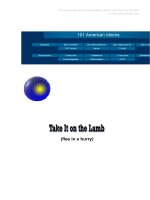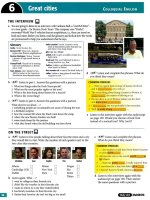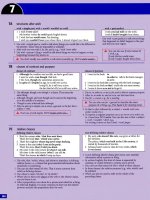055 american english
Bạn đang xem bản rút gọn của tài liệu. Xem và tải ngay bản đầy đủ của tài liệu tại đây (240.21 KB, 4 trang )
1
Prof. Francisco Zabala - 2016
General American English
Languages are not monolithic. Variation and change are natural processes in the development of a language. Within the study
of variation, there’s a first distinction to be made, that of the concepts of “accent” and “dialect”. According to Hughes et. al.
(2005:2), “we use dialect to refer to varieties distinguished from each other by differences of grammar and vocabulary.
Accent, on the other hand, refers to variations in pronunciation.”
Cruttenden (2014) discusses how to compare systems of pronunciation. He focuses on four dimensions:
• Systemic differences: there may be more or fewer phonemic contrasts. For example, American English doesn’t have
centring diphthongs .H?+
d?+
T?.. They treat them as sequences of .H+
d+
T. followed by .q..
Steer
GB .!rsH?.
GA .!jkHq.
Claire
GB .!jkd?.
GA .!rsdq.
Poor
GB .!oT?.
GA .!oTq.
•
Distributional differences: the phonetic context in which a sound occurs may vary. For example, both General British
and General American have a .q. phoneme, but this sound is lost before consonants in General British English.
Card
GB .!j@9c.
GA .!j@9qc.
•
Lexical differences: some varieties of English use one phoneme, while others use another one.
Vase
GB .!u@9y.
GA .!udHy.
•
Realisational differences: the phonetic quality of some phonemes may be different. For example, .k. tends to be
darker in all positions in General American.
Late
GB Z!kdHs\
GA Z!4dHs\
Wells (2008: xx) defines the General American Accent as the one “spoken by the majority of Americans, namely those who do
not have a noticeable eastern or southern accent.”
Wells (1982: 471)
Although these three accent groups are really different from each other, this doesn’t mean that they are uniform entities. The
USA is such a huge country that there are lots of local subgroups. However, since the USA is a relatively young country, most of
its territory was settled quite recently and, as a consequence, a relatively uniform variety (i.e. General American) spread.
• The first successful settlements were the Virginia Colony in Jamestown in 1607 and the Pilgrims’ Colony in 1620. These
early settlers came mainly from England, and they brought their rhotic English with them.
• Many Scots and Irish people started to populate the growing new cities in the Eastern Coast.
• As the cities grew in the 1700’s, many settlers started to move west up to the Appalachian Mountains and south in the
Carolinas.
th
• In the 19 century the country grew exponentially: Louisiana was bought from the French, while Florida, Texas and
California were annexed. The westward expansion was over in less than a hundred years, and it was the mid-western
accent that spread with it. Also, the Deep South grew because of their profitable cotton plantations.
• General American is a rhotic accent because British English was rhotic at the time of the colonisation of America. The
North Eastern American cities that had ports and were closely connected with Britain, however, became non-rhotic.
Prof. Francisco Zabala - 2016
•
2
Watch the following scene. Then, watch it again and pay attention to the pronunciation of the shaded
elements. How do they compare with a General British pronunciation? Try to transcribe what you hear
between the square brackets.
How I Met your Mother (Pilot Episode - 2005)
NARRATOR:
Kids, I’m going to tell you an incredible story. The story of how I met your
[ ]
[ ]
[ ] [ ]
mother.
[ ]
SON:
Are we being punished for something?
[
]
NARRATOR: No.
DAUGHTER: Yeah, is this going to take a while?
NARRATOR: Yes. Twenty-five years ago, before I was dad, I had this whole other life.
[
]
[
]
[ ]
[ ]
NARRATOR: It was way back in 2005. I was twenty-seven just starting to make it as an
architect and living in New York with Marshall, my best friend from college.
[ ]
My life was good and then Uncle Marshall went screwed the whole thing up.
[ ]
MARSHALL: Will you marry me?
[ ]
TED:
Yes, perfect! And then you’re engaged, you pop the champagne! You drink a
toast! You have sex on the kitchen floor… Don’t have sex on our kitchen
floor.
MARSHALL: Got it. Thanks for helping me plan this out, Ted.
TED:
Dude, are you kidding? It’s you and Lily! I’ve been there for all the big
[ ]
[
]
[ ]
moments of you and Lily. The night you met. Your first date… other first
[ ]
things.
MARSHALL: Yeah, sorry. We thought you were asleep.
TED:
It’s physics Marshall, if the bottom bunk moves, the top bunk moves too.
[ ]
My god, you’re getting engaged tonight.
[ ]
MARSHALL: Yeah, what are you doing tonight?
NARRATOR: What was I doing? Your Uncle Marshall was taking the biggest step of his
[
]
life, and me — I’m calling up your Uncle Barney.
BARNEY:
Hey, so you know how I’ve always had a thing for half-Asian girls? Well,
now I’ve got a new favorite: Lebanese girls! Lebanese girls are the new half[
]
[ ]
Asians.
TED:
Hey, you wanna do something tonight?
BARNEY:
Okay, meet me at the bar in fifteen minutes, and Suit up!
3
Prof. Francisco Zabala - 2016
ˈhaʊ aɪ ˈmet jər ˈmʌðər || ˈpaɪɫət ˈepɪsoʊd ||
ˈnereɪɾər ||
ˈkɪdz | aɪm ɡənə tə ˈteɫ ju | ən ɪŋˈkredəbɫ ˈstɔːri || ðə ˈstɔːri | əv ˈhaʊ | aɪ ˈmeʔ | jər ˈmʌðər ||
ˈsʌn ||
ər ˈwiː ˈbiːɪŋ ˈpʌnɪʃ fər ˈsʌmθɪŋ ||
ˈnereɪɾər ||
ˈnoʊ ||
ˈdɑːɾər ||
ˈjeə || ɪz ðɪs ɡənə tə ˈteɪk ə ˈwaɪɫ ||
ˈnereɪɾər ||
ˈjes || ˈtweni ˈfaɪv ˈjɪrz əˈɡoʊ | bɪˈfɔːr aɪ wəz ˈdæd | aɪ ˈhæd ðɪs ˈhoʊɫ ˈʌðər ˈɫaɪf ||
ˈnereɪɾər ||
ɪʔ wəz ˈweɪ ˈbæk | ɪn ˈtuː ˈθaʊzənd ən ˈfaɪv || aɪ wəz ˈtweni ˈsevn | dʒəst ˈstɑːrɾɪŋ ɾə ˈmeɪk ɪɾ
əz ən ˈɑːrkəˌtekt | ən ˈɫɪvɪŋ ɪn ˈnuː ˈjɔːrk | wɪθ ˈmɑːrʃɫ | maɪ ˈbes ˈfren frəm ˈkɑːɫɪdʒ || maɪ ˈɫaɪf
| wəz ˈɡʊd || ən ˈðen ˈʌŋkəɫ ˈmɑːrʃɫ | ˈwent ˈskruːd ðə hoʊɫ ˈθɪŋ ʌp ||
ˈmɑːrʃɫl |
wɪl ju ˈmeri mi ||
ˈted ||
ˈjes || ˈpɜːrfekt || ən ˈðen jər ɪŋˈɡeɪdʒd || ju ˈpɑːp ðə ʃæmˈpeɪn || ju ˈdrɪŋk ə ˈtoʊst || ju ˈhæv
ˈseks ɑːn ðə ˈkɪtʃən ˈfɫɔːr || ˈdoʊnt hæv ˈseks ɑːn ˈɑːr ˈkɪtʃən ˈfɫɔːr ||
ˈmɑːrʃɫ ||
ˈɡɑːɾ ˈɪt || ˈθæŋks fər ˈheɫpɪŋ mi ˈpɫæn ðɪs ˈaʊt ˈted ||
ˈted ||
ˈduːd || ər ju ˈkɪɾɪŋ || ɪts ˈjuː ən ˈɫɪɫi || aɪv ˈbɪn ðeər fər ˈɑːɫ ðə ˈbɪɡ ˈmoʊmənts əv ˈjuː ən ˈɫɪɫi ||
ðə ˈnaɪʔ ju ˈmeʔ | jər ˈfɜːrs ˈdeɪt | ˈʌðər ˈfɜːrs ˈθɪŋz ||
ˈmɑːrʃɫ ||
ˈjeə || ˈsɑːri || wi ˈθɑːtʃu wər əˈsɫiːp ||
ˈted ||
ɪts ˈfɪzɪks ˈmɑːrʃɫ || ɪf ðə ˈbɑːɾəm ˈbʌŋk ˈmuːvz | ðə ˈtɑːp ˈbʌŋk ˈmuːvz ˈtuː || maɪ ˈɡɑːd ||
jər ˈɡeɾɪŋ ɪŋˈɡeɪdʒd təˈnaɪt ||
ˈmɑːrʃɫ ||
ˈjeə || ˈwʌɾ ər ˈjuː ˈduːɪŋ təˈnaɪt ||
ˈnereɪɾər ||
ˈwʌt ˈwʌz aɪ ˈduːɪŋ || jər ˈʌŋkəɫ ˈmɑːrʃɫ | wəz ˈteɪkɪŋ ðə ˈbɪɡəst ˈstep əv ɪz ˈɫaɪf | ən ˈmiː |
aɪm ˈkɑːɫɪŋ ˈʌp jər ˈʌŋkəɫ ˈbɑːrni ||
ˈbɑːrni ||
ˈheɪ || soʊ ju ˈnoʊ ˈhaʊ aɪv ˈɑːɫweɪz ˈhæɾ ə ˈθɪŋ | fər ˈhæf ˈeɪʒn ˈɡɜːrɫz || weɫ ˈnaʊ aɪv ˈɡɑːɾ ə
ˈnuː ˈfeɪvrət || ˈɫebəˈniːz ˈɡɜːrɫz | ˈɫebəˈniːz ˈɡɜːrɫz | ər ðə ˈnuː ˈhæf ˈeɪʒnz ||
ˈted ||
ˈheɪ || ju ˈwɑːnə duː ˈsʌmɪŋ təˈnaɪt ||
ˈbɑːrni ||
ˌoʊˈkeɪ || ˈmiːʔ mi ət ðə ˈbɑːr | ɪn ˈfɪfˈtiːn ˈmɪnəts || ən ˈsuːɾ ˈʌp ||
4
Prof. Francisco Zabala - 2016
Feature Analysis: Comparison
between General British and General American
Feature
General British
General American
KIT
FLEE
EECE
FL
EECE
DRE
DRESS
STRU
STRUT
TRA
TRAP
BATH
PALM
ALM
STAR
START
ART
LO T
CLO
CLOTH
THOU
THOUGHT
OUGHT
NORTH
ORTH
FORCE
ORCE
FOOT
OOT
NURSE
URSE
lettER
lettER
commA
commA
happY
happY
thank YOU
YOU
FACE
GOAT
OAT
GOOSE
OOSE
PRI
PRICE
CHOI
CHOICE
OICE
MOUTH
OUTH
NEAR
SQUARE
SQUARE
CURE
WORRi
ORRi
.H.
.h9.
.d.
.U.
.z.
.H.
.h9.
.d.
.U.
.z.
Zz+
z?+
D?\
.@9.
.z.
Phonemic mapping
.@9.
.@9.
No major differences
.@9.
.P.
.P.
.N9.
.N9.
.N9.
.T.
.29.
.?.
.?.
.h.
.t.
.dH.
.?T.
.t9.
.`H.
.NH.
.`T.
.H?.
ZH?+
H9\
.d?.
ZD?+
D9\
.T?.
ZT?+
T9+
N9\
.Uq.
Rhoticity in GA – /r/ coloured vowel
MARRi
ARRi
.zq.
RabbI
RabbIT
BlackBE
BlackBERRY
LavaTO
LavaTORY
Address
Dictate
Dictate
.H.
.!akzja'?(qh.
.!kzu?s'?(qh.
.?!cqdr.
.@9q.
Z@˛9q\
.@9.
.@9+
P9.
.@9+
P9.
.N9q.
ZN˛9q\
.N9q+
n9q.
ZN˛9q+
n˛9q\
.T.
.29q.
Z2˛9q\
.?q.
Z?˛q\
.?.
.h.
.t.
.dH.
.nT.
.t9.
.`H.
.NH.
.`T.
.Hq.
ZHq+
hq\
.dq.
Zdq\
.Tq.
ZTq+
tq+
n˛9q+
2˛9q\
.29q.
.dq+
zq.
Mary = merry = marry
.?+
H.
.!akzj$adqh.
.!kzu?$sN9qh.
.!zcqdr.
.cHj!sdHs.
.!cHjsdHs.
stress
NEW
Lab
.it9.
.t9.
Yod-dropping
Zk\
Z4\
Phonetic realization
Red
.q.
Z¢\
.q.
Z¢+
±\
writ
writing
rid
riding
Twent
Twenty
.s.
Zɾ\
Regular tapping of unstressed, intervocalic
.c.
Zɾ\
.!svdmh.
/t, d/ in GA
.!svdmsh.
Comments
No major differences
Phonetic realisation
Possible CLOT-LOT-THOUGHT merger
Rhoticity in GA – /r/ coloured vowel
No major differences
Rhoticity in GA – /r/ coloured vowel
No major differences
Phonetic realisation
No major differences
Rhoticity in GA – /r/ coloured vowel
Loss of phonemic contrasts
Phonemic mapping
Phonemic. Mary – merry – marry merger
Phonemic neutralisation
Different stress pattern: strong endings
Different stress pattern: shift of primary
Possible retroflex (more curled back) /r/ in
GA
Dropping of /t/ in GA









